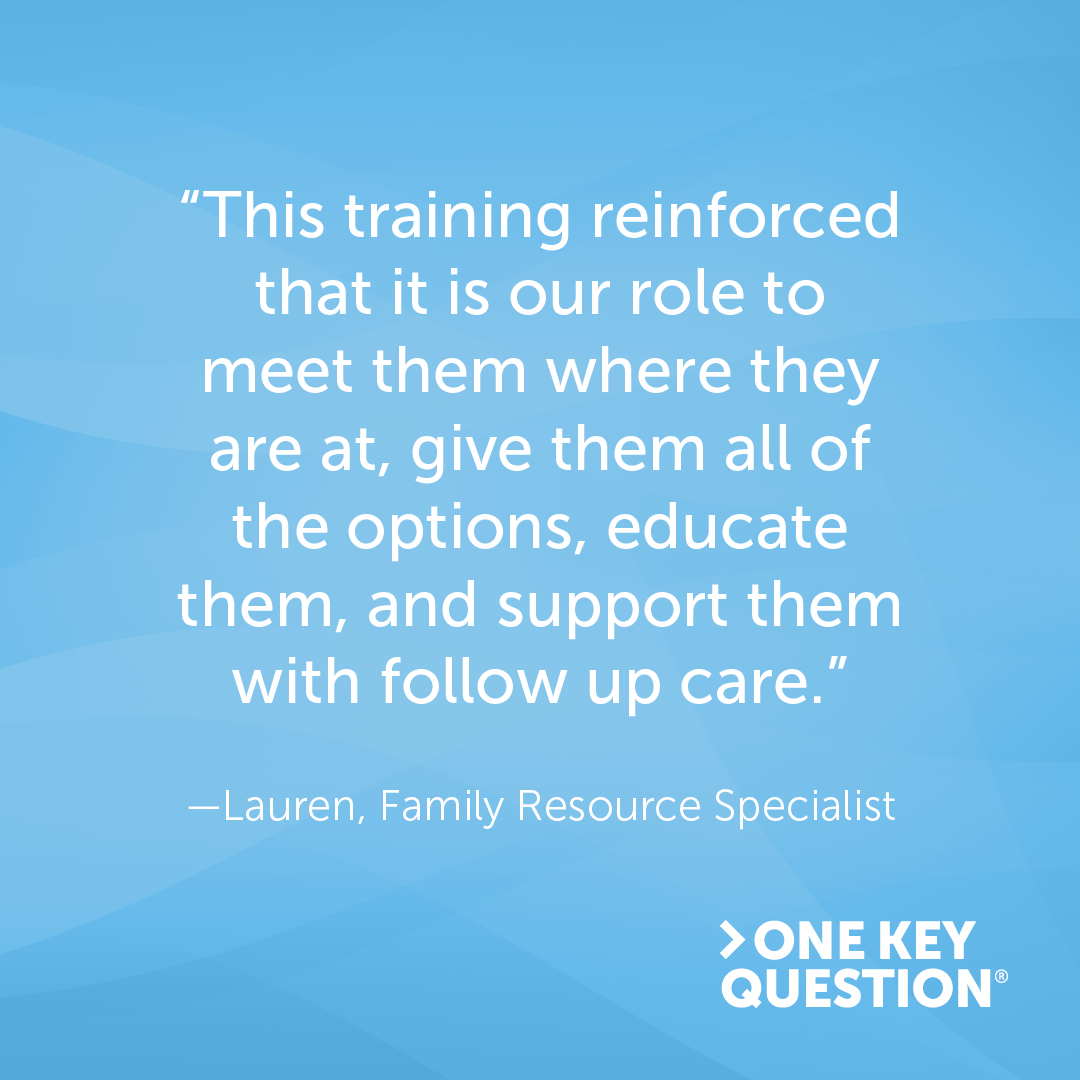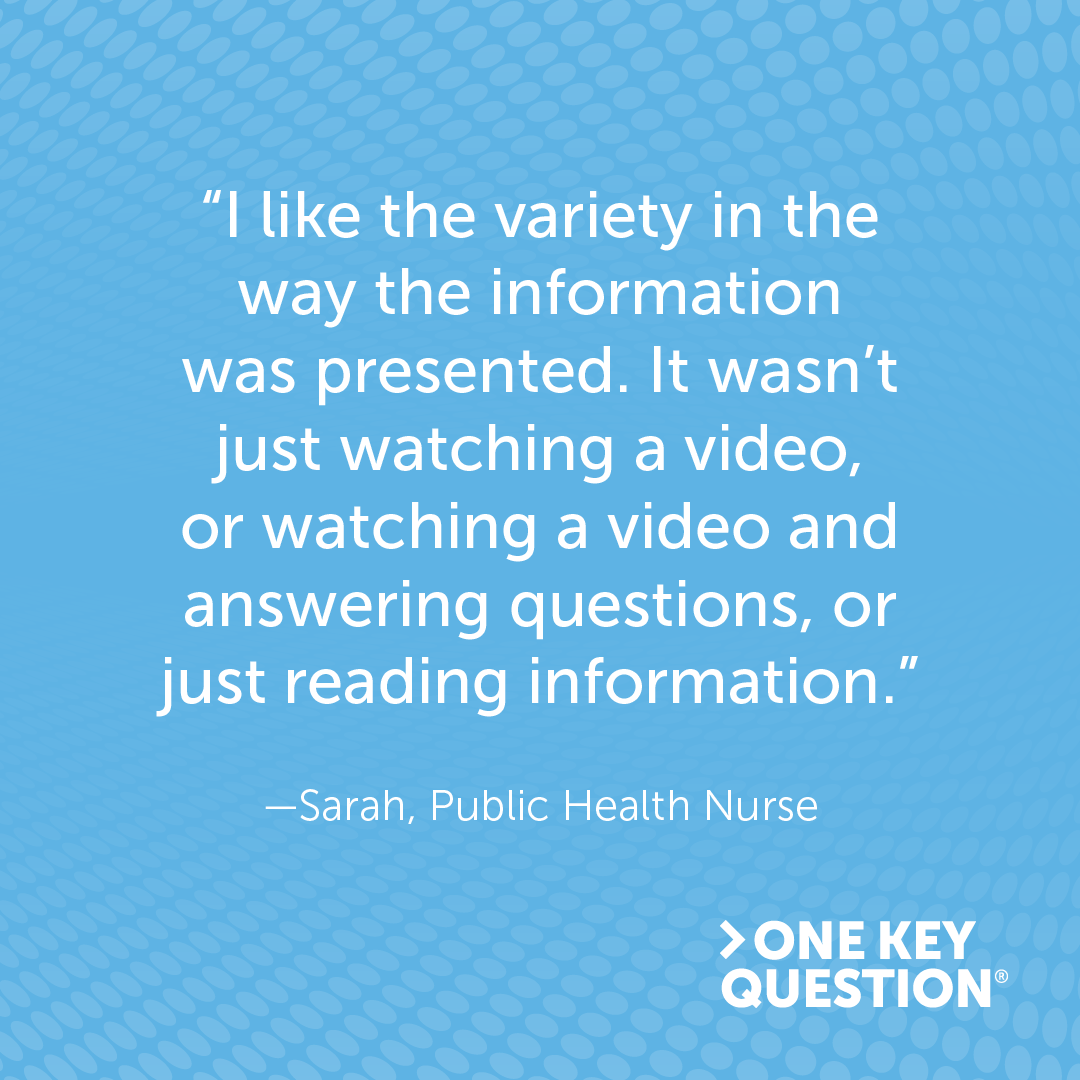Increasing Patient Satisfaction
Meeting patients where they are and recognizing that there are many factors that affect pregnancy desire, led to the creation of One Key Question®. This pregnancy desire screening tool helps health care and social service providers start a conversation with patients about if, when, and under what circumstances they want to get pregnant and have a child.
By routinely asking “Would you like to become pregnant in the next year?” and allowing patients to answer one of four ways—yes, no, unsure, or ok either way—One Key Question captures the nuanced and personalized nature of family planning desires. Importantly, One Key Question is not simply a question, but an entire tool designed to revolutionize health care.
A study recently published in the journal Contraception found significant increases in patient satisfaction in both primary care and OB/GYN practices when One Key Question was integrated. The study, entitled Effects of Clinic-level Implementation of One Key Question on Reproductive Health Counseling and Patient Satisfaction, is the first published study to evaluate Power to Decide’s One Key Question in comparison with control practices.
Additionally, patients reported an increase in reproductive health counseling at practices that implemented One Key Question, although this finding was not statistically significant.
“The One Key Question approach focused on patient-centered counseling and shared decision-making for reproductive health, so I was not at all surprised to see patient satisfaction increase,” said senior study author Dr. Debra Stulberg, Chair of Family Medicine at the University of Chicago.
A rise in maternal mortality and increased restrictions in accessing contraception have reinforced the importance of integrating comprehensive family planning services, including contraceptive and preconception counseling as a critical part of routine care.
The study findings and what they mean for reproductive health are encouraging. Notably, results suggest that One Key Question has potential to positively impact reproductive health care. In addition, One Key Question appears successful in reaching patients where they are; study results show that patients are receptive and satisfied with the counseling provided. For health care and social service providers, this work highlights the importance of shared decision-making approaches to reproductive health care and offering patient-centered counseling based on patient’s needs and desires.
This is exactly what patients want.
Patients want health care providers to ask them about their own goals and desires, then offer them the services they deserve based on their responses. This approach reflects the simple truth that many patients are ambivalent about pregnancy. A simple yes or no response to pregnancy desire does not reflect the reality of many patients’ lives. And every person should have the power to decide if, when, and under what circumstances to get pregnant and have a child.

This unique training suite now meets health care providers where they’re at as well as it is available for the first time online. One Key Question Online offers a suite of interactive trainings for non-clinical and clinical providers alike.
The One Key Question Certification Training takes 4-6 hours to complete and can be taken at any time, from any location. It covers topics such as reproductive well-being, unconscious bias in family planning, and how to implement this program at clinical and non-clinical sites. Ultimately, the training helps providers adopt a new, patient-centered approach for discussing family planning with their clients.

Once certified, providers are eligible to take a supplemental 1-2 hour training called Preconception and Contraception Pathways to Care. This training builds on the One Key Question Certification Training by diving deeper into patient-centered counseling, teaching providers how to center patients’ desires as the conversation continues. Based on each patient’s response, providers are trained on how to offer follow-up counseling in a non-judgmental and unbiased way and how to build individual pathways to care, whether directly or through referrals.

Both trainings are interactive and use videos, case studies, reflections, and activities to engage with the content. Clinical and non-clinical providers learn how to ask patients and clients about their pregnancy desires and respond with the type of care they deserve.
Used by thousands of health care and social service providers in approximately 30 states, One Key Question’s providers include clinicians, community health workers, and home visiting nurses as well as large health systems and state and local public health departments.
Join thousands of trained providers by registering today.


